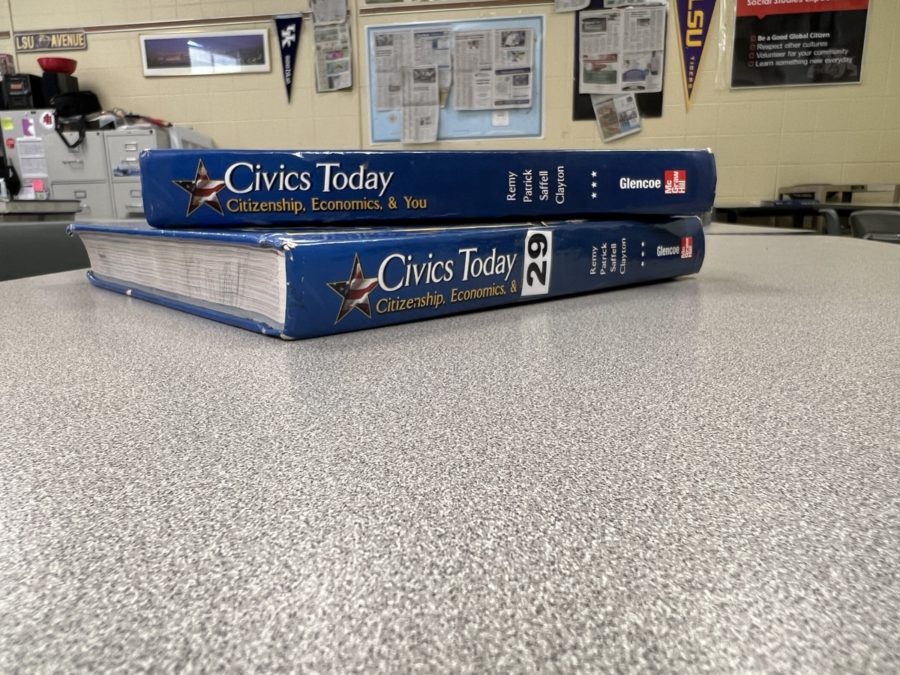How Legislators Want to Change KY Social Studies
Teachers believe the language of SB 138 is vague and concerning, and they feel it would prohibit important educational conversations.
Logan Justice
Civics Today: Citizenship, Economics, and You textbook used in the Dunbar Government classes.
March 14, 2022
In early February, Senator Max Wise (R) introduced Senate Bill 138, also known as the “Teaching American Principles” act. On Feb. 24, Senators were split along party lines in a 28-8 vote in favor of SB138 which affects KY social studies teachers.
The bill primarily focuses on regulating the Kentucky social studies curriculum by giving teachers a list of 24 texts, specifying how to discuss current policies, and addressing how to discuss topics of racism.
Since the initial floor discussion the bill has been amended many times, but some wonder why it was proposed in the first place.
“The list of documents includes many that are already being taught. The guidance on how they can be taught is ambiguous,” Dunbar social studies teacher Mr. Mickey Campbell said.
The original bill prohibited “an employee of a local school district or public charter school from being compelled to discuss current events or controversial topics.” This language was later removed in a Committee Substitute.
In support of the bill, Sen. Stephen Meredith (R) spoke against teacher “indoctrination” during the floor debate. He said that he took issue with a teacher in his district who allegedly said that “socialism is not all that bad.”
“The fact that you have a college degree in education and in history does not give you an unfiltered license to say and do whatever you want to do. This is not censorship, it’s teaching responsible history.”
“There’s got to be some guardrails that you can’t say whatever you want to in a classroom,” he said.
“[SB 138] creates a boogeyman that does not exist, and I also feel this bill handcuffs teachers by telling them what they can and cannot teach in their classroom,” Sen. Reggie Thomas (D) said in response to the legislation.
The 24 specific writings to be taught include items such as the Declaration of Independence, which are already widely used. However, some question the reasoning behind Ronald Reagan’s speech “A Time for Choosing” which was a televised criticism of the Democratic party and an endorsement of Barry Goldwater, a Republican nominee for President in 1964.
The writings were selected by Sen. Wise, who proposed the bill. He said that he used recommended texts from Ohio’s Ashbrook Center, an organization named after Congressman John M. Ashbrook (R).
According to their mission statement, the center works “[to] strengthen the capacities of the American people for constitutional self-government.”
The Ashbrook Center is a member of the State Policy Network (SPN), a group of right-wing media institutions, advocacy groups, leadership training centers, and funding institutions. SPN is an arm of the American Legislative Exchange Council (ALEC).
This partisan connection has led some to believe that the legislation may be about more than just a concern for students’ education.
“I have been a Social Studies teacher for over 30 years. I tell my students from day one that I do not have an agenda. There is no column in the grade book that says ‘Agreed with Teacher.’ I want students to confront the highs and lows of our history and make their own assessments,” Mr. Campbell said.
The KY chapter of the American Federation of Teachers “strongly opposes” the bill.
“[The] American Federation of Teachers (AFT) has publicly condemned the legislation. We have reached out to legislators and asked members to call as well,” Dunbar social studies teacher and AFT Representative Mrs. Sharessa Crovo said.
“Our hands are tied but our voices are clear,” she said.
In their official statement against SB138 KY 120 United stated, “It is clear from the bills that continue to be introduced that the Republican-led legislature is intent on limiting discourse about the realities of our history. We do not have to wonder whose reality counts when we see this kind of legislation. They are bent on protecting their whitewashed version of history instead of making sure a history that includes the realities of ALL Kentucky students is learned.”
Conversely, during the floor debate, Senator Wise attempted to clarify his position and purpose.
“Rather than instructing our students on how to think, let’s guide them on what to think and to think about,” he said.
However, Sen. Wise also said the bill is meant to give teachers “guidance” on materials, adding “We are not telling teachers what they can and cannot teach and what our students can and cannot learn,” he said.
Tyler Murphy, Fayette County Board of Education chair and social studies teacher was critical of the texts in a recent Op-Ed published in the Lexington Herald-Leader. He was especially concerned about the Reagan speech which he referred to as having “a partisan tone promoting Barry Goldwater.”
Mr. Campbell said that many of the texts included in the bill are already taught in schools, questioning the true intent of SB 138.
“I am disappointed that the Legislature in Frankfort has chosen to spend valuable time and resources addressing a problem that frankly does not exist,” he said.
Murphy’s Op-Ed also voiced concern about the danger of losing local control of the curriculum.
“Regardless of the list’s composition, its most alarming aspect is simple,” he said. “A legislature with the power to dictate what documents and texts must be taught in classrooms also has the power to dictate what documents and texts must not be taught.
As of March 11, Kentucky educators are anxiously awaiting the controversial bill to be assigned to the House Education Committee.
This story was originally published on The Lamplighter on March 11, 2022.




































